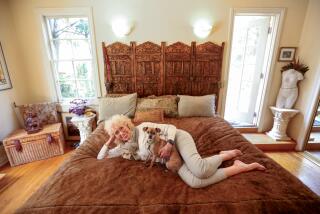Washboards Aren’t Really Washed-Up
- Share via
LOGAN, Ohio — Pharmaceutical wholesaler George D. Richards was skeptical when his son first approached him with the idea of investing in a washboard company.
“I said, ‘Who’s buying washboards?’ ” he said.
But, Richards found, “the more you get into it, you realize there are billions of people out there and they’re still using rocks.”
His son, G.K. Richards, persuaded him and seven others to invest in the Columbus Washboard Co., which they say is the industry’s last U.S. manufacturer. With some help from collectors and from people worried about Y2K computer bugs, the investment last June has kept alive a company that seemed headed for extinction.
Former owner Mike Taylor said he could no longer stay in business after 12 years leading Columbus Washboard, founded in 1895 and inherited by his wife from her uncle.
He had sold 50,000 to 60,000 metal and glass washboards in 1998, down considerably from peak sales of about 1.3 million in 1941. And operating costs were outstripping profits.
Although Columbus Washboard’s domestic rivals had disappeared by the 1970s, the company faced competition from cheaper imports. But cutting back on quality was not an option in a market where demand grew to be more for craft than function, Taylor said.
He also had trouble hiring and keeping workers in Columbus, where unemployment has been low.
“I finally reached the point--it was a tough point to reach--(where) we would just liquidate it.”
The younger Richards learned about Taylor’s plans through a column in the Columbus Dispatch. Shortly afterward, he happened by the factory and looked inside, figuring it wouldn’t be around much longer.
“Before I knew what I had said, I said, ‘I think I’m here to buy your company,’ ” Richards said.
Richards formed the investment group and bought the business and its brands, including Sunnyland, Maid-Rite and Crystal Cascade, for an undisclosed price.
The company’s equipment, dating to the early 1940s, was moved about 45 miles away to a former shoe factory in Logan that now has a large washboard hanging outside. The product line has expanded and the washboards--previously made only with white pine--are also being made with more decorative, yet less durable, poplar.
Nearly 30,000 washboards have been sold since operations began under the new owners, who hope to sell 100,000 by the end of this year. They retail for $9 to $24, depending on the size and rubbing surface.
The factory recently shipped a total of about 1,900 washboards to Nassau, Bahamas, and Honolulu, said factory manager and co-investor Jacqueline Barnett.
Marketing and a fear of the Y2K computer glitch have helped sales. The company had a Y2K collectors’ edition washboard and plans to offer a different collectors’ edition washboard each year.
Columbus Washboard also has steady customers, such as stores that serve the Amish community. One store, Lehman’s, sells an average of 500 washboards a year, but Y2K sales pushed that number to 1,000 last year, according to Galen Lehman, vice president of operations.
Musicians are a niche market for washboards. Musician Mike Johnson, of Parker, Colo., has compiled a list of washboard players in the United States and 22 other countries, including Israel and Brazil. “Anyone who wants to play one gets theirs from Columbus Washboard,” he said.
Sue Kroninger of Big Mama Sue and the Low Society Jazz Band in Santa Cruz, Calif., began playing the washboard 12 years ago.
“It was one I bought in a junk store,” she said. “I rubbed through it.”
She now plays on a custom-built model with a stainless steel surface designed after her original from Columbus Washboard.
Another customer, Bill Harvey, of Ocala, Fla., buys up to 420 washboards a year and turns them into medicine cabinets, night stands, microwave tables, magazine racks, trash containers and planters that he sells at craft shows.
“Just a whole bunch of things, whatever I can put doors on,” he said.
More to Read
Inside the business of entertainment
The Wide Shot brings you news, analysis and insights on everything from streaming wars to production — and what it all means for the future.
You may occasionally receive promotional content from the Los Angeles Times.








